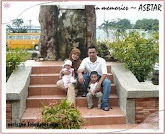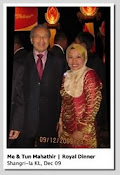Assalamualaikumm..
Aha... kepada yang berkenaan, sudahkan anda submit e-Filing..?
Aku SUDAH...! Setelah seminggu dalam draft akhirnya
ku submit jua uhuhuhu.
Tak bleh blah betul dengan slogan e-Filing tahun ni
"ANDALAH WIRA NEGARA" gitewww.....!
Kepada kerajaan.. TOLONGLAH
gunakan tax yang ku bayar tu dengan berkhemah ok.
Tak nak dengar dah kes beli cincin juta juta.... No NO NO!!!
Kes-kes kelulusan & peruntukan projek lain tengok2 buat benda lain..
double NO NO NO!!!!
Anyway nak share TIPS2 on
How To Pay LESS PERSONAL TAX
THE 2009 tax-filing season for individuals has arrived. For many of us, April 30 will be just another day (perhaps accompanied by scrambling for our just-in-time filing) to settle our dues with the Inland Revenue Board by submitting the Form e-BE and paying any balance tax.
Before clicking the button to complete the e-filing, take a second look at the figures keyed in. Is the amount of tax calculated the lowest it can be? Here are some tips on saving tax that would not get you in trouble with the law.
1. Know your income: What is taxable and what is not.
Gone are the days when you agonise over the delay in receiving your Form EA from your employer. It is now a law for employers to issue the Form EA to their employees no later than the end of February. The key point to note is not all income in your Form EA is taxable! Scrutinise all the items in Form EA to see if there is any which should be tax-free. For example:
Travelling allowances
If you receive travelling allowance, up to RM2,400 for your travels from home to office is tax-free. What this means is if you receive an allowance of RM12,000 for such travel, you can deduct RM2,400 and only RM9,600 is taxable. Further, travelling allowance of up to RM6,000 for official duties is tax-exempt.
Meal, parking and childcare allowances
Many employees receive these allowances, do you? You would be happy to know that you can enjoy such perks with no worries about paying tax thereon (up to RM2,400 in the case of childcare allowance).
2. Make the most of all tax-free benefits.
Medical benefits
Medical benefits for traditional medicine including ayurvedic, plus maternity benefits are also tax-free.
Interest subsidies
Your employer may have subsidised interest on your housing, car and education loans. In the past, these subsidies would be taxable on you. Now you would be glad to know such interest subsidies are tax-exempt (so long as the total loans do not exceed RM300,000).
Broadband and telephone benefits
Who can leave home without the iPhone, Blackberry or PDAs nowadays? Getting such a device from your employer plus reimbursement for broadband and telephone bills are tax-free. So take advantage and enjoy the latest gadgets and services.
3. Know your limits.
Just as in drinking and driving, stay within the limits to avoid any trouble or triggering tax.
If you have enjoyed any staff benefits like discounts on your company’s goods or services and kept within the RM1,000 a year limit, you should enjoy tax exemption thereon.
Did you receive a small token from your employer on your achievements in service excellence, innovation or productivity which brought on a smile? Don’t blame your employer if they kept the awards below RM2,000 as no tax should be levied on you. Neither is the award for your long service with the company (for more than 10 years) forgotten. As long as your employer kept the value of all awards to you within the RM2,000 limit, the smile should remain on you.
4. Look for more tax-free income.
Bank interest income
You will note a subtle difference in your bank statement nowadays as it no longer shows the amount of tax withheld. Bank interest income is now tax-exempt.
Dividends
Dividends need not be entirely taxable. Have a good look at the dividend voucher. If it states that the dividend is “tax-exempt”, then it is not taxable anymore.
5. Gain more deductions.
Purchase of sports equipment
If the slimming fad has caught on with you, keep the receipts of your purchases of any sports equipment. A claim of up to RM300 is a small incentive to shape those curves and muscles in a big way!
Have receipts or evidence to support more deductions
Medical expenses for your parents certified by a medical practitioner (restricted to RM5,000);
Medical expenses for serious diseases for self, spouse or child (up to RM5,000), including a complete medical examination for self, spouse or child limited to RM500;
Basic supporting equipment for disabled self, spouse, child or parents (ceiling of RM5,000);
Disabled person (self) (RM6,000);
Disabled husband/wife (RM3,500);
Education fee (self) up to tertiary level for the purpose of acquiring law, accounting, Islamic financing, technical, vocational, industrial, scientific or technological skills or qualifications for a masters or doctorate level, undertaken for the purpose of acquiring any skill or qualification (limited to RM5,000);
Purchase of books/journals/magazines/similar publications for self, spouse or child (up to RM1,000);
Net deposit in National Education Savings Scheme (ceiling of RM3,000);
Purchase of personal computer for individual (maximum deduction of RM3,000 allowed once every three years);
Premiums on life insurance plus EPF and other approved fund contributions (subject to RM6,000 restriction);
Premiums for education or medical insurance (restricted to RM3,000);
Relief of up to RM10,000 on the housing loan interest paid (conditions apply);
Payment of alimony to former wife (maximum total deduction for wife and alimony payment is RM3,000);
Zakat other than monthly zakat deduction from salary; and
Fees/levy paid by a holder of an employment pass, visit pass (temporary employment) or work pass.
The rule of the “game” of keeping your tax liability to the minimum when preparing your tax return Form e-BE is to do it right within the law. For a start, make the website of the Inland Revenue Board, www.hasil.gov.my, one of your favourites from now until April 30 to access its easy to read guides. Happy e-filing!
● Ang Weina is executive director and global employer services leader with the tax practice of Deloitte Malaysia.













































.jpg)




















.jpg)










































































.jpg)















